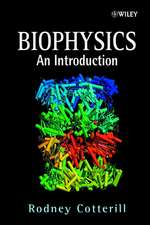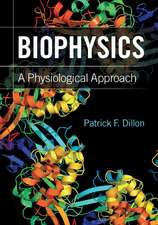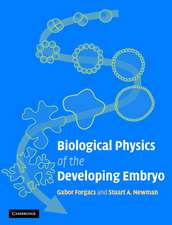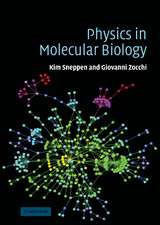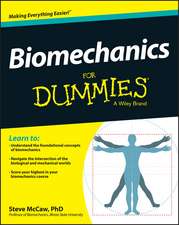Cellular Signaling in Health and Disease: Biological and Medical Physics, Biomedical Engineering
Autor Martin Beckermanen Limba Engleză Hardback – 22 iun 2009
The stability of the health- and disease-associated states is dynamic and supported by multiple feedback loops acting positively and negatively along with linkages between pathways. During the past few years an ongoing series of important discoveries have been made that advance our understanding of how the body works and may guide us on how to better deal with these diseases. These include the discovery of chronic inflammation as a causal factor in all of these disease classes, the appearance of reactive oxygen species as a messenger molecule that can act both positively and negatively, the propensity of proteins to misfold into aggregation- and disease-prone forms, and the rise of epigenetics including the emergence of small non-coding RNA with important regulatory functions out of the so-called junk RNA. Chapters are devoted to each of these classes of findings with additional detailsintegrated into the chapters dealing directly with the diseases. The connections responsible for maintaining stability are explored in depth.
| Toate formatele și edițiile | Preț | Express |
|---|---|---|
| Paperback (1) | 953.65 lei 6-8 săpt. | |
| Springer – 6 dec 2010 | 953.65 lei 6-8 săpt. | |
| Hardback (1) | 959.19 lei 6-8 săpt. | |
| Springer – 22 iun 2009 | 959.19 lei 6-8 săpt. |
Din seria Biological and Medical Physics, Biomedical Engineering
- 5%
 Preț: 1110.32 lei
Preț: 1110.32 lei - 18%
 Preț: 1006.55 lei
Preț: 1006.55 lei - 18%
 Preț: 960.78 lei
Preț: 960.78 lei - 18%
 Preț: 704.10 lei
Preț: 704.10 lei - 18%
 Preț: 967.40 lei
Preț: 967.40 lei - 18%
 Preț: 948.92 lei
Preț: 948.92 lei - 15%
 Preț: 641.71 lei
Preț: 641.71 lei - 15%
 Preț: 644.95 lei
Preț: 644.95 lei - 15%
 Preț: 665.08 lei
Preț: 665.08 lei - 18%
 Preț: 1669.16 lei
Preț: 1669.16 lei - 18%
 Preț: 941.05 lei
Preț: 941.05 lei - 18%
 Preț: 956.81 lei
Preț: 956.81 lei - 18%
 Preț: 950.21 lei
Preț: 950.21 lei - 15%
 Preț: 636.80 lei
Preț: 636.80 lei - 18%
 Preț: 947.50 lei
Preț: 947.50 lei - 15%
 Preț: 636.80 lei
Preț: 636.80 lei -
 Preț: 397.01 lei
Preț: 397.01 lei - 18%
 Preț: 1236.99 lei
Preț: 1236.99 lei - 15%
 Preț: 644.49 lei
Preț: 644.49 lei - 18%
 Preț: 946.55 lei
Preț: 946.55 lei - 15%
 Preț: 712.22 lei
Preț: 712.22 lei - 18%
 Preț: 952.89 lei
Preț: 952.89 lei - 18%
 Preț: 944.36 lei
Preț: 944.36 lei - 18%
 Preț: 1228.29 lei
Preț: 1228.29 lei - 5%
 Preț: 1422.67 lei
Preț: 1422.67 lei - 18%
 Preț: 1393.27 lei
Preț: 1393.27 lei - 15%
 Preț: 651.19 lei
Preț: 651.19 lei - 18%
 Preț: 953.65 lei
Preț: 953.65 lei - 18%
 Preț: 955.88 lei
Preț: 955.88 lei - 15%
 Preț: 644.95 lei
Preț: 644.95 lei - 5%
 Preț: 1098.48 lei
Preț: 1098.48 lei - 18%
 Preț: 959.19 lei
Preț: 959.19 lei - 15%
 Preț: 643.65 lei
Preț: 643.65 lei - 5%
 Preț: 1159.16 lei
Preț: 1159.16 lei - 5%
 Preț: 1102.67 lei
Preț: 1102.67 lei - 18%
 Preț: 952.09 lei
Preț: 952.09 lei - 18%
 Preț: 946.55 lei
Preț: 946.55 lei - 18%
 Preț: 952.09 lei
Preț: 952.09 lei - 15%
 Preț: 703.20 lei
Preț: 703.20 lei - 18%
 Preț: 953.65 lei
Preț: 953.65 lei - 5%
 Preț: 1008.41 lei
Preț: 1008.41 lei - 15%
 Preț: 644.82 lei
Preț: 644.82 lei - 18%
 Preț: 956.03 lei
Preț: 956.03 lei - 15%
 Preț: 647.40 lei
Preț: 647.40 lei
Preț: 959.19 lei
Preț vechi: 1169.74 lei
-18% Nou
Puncte Express: 1439
Preț estimativ în valută:
183.54€ • 192.14$ • 151.87£
183.54€ • 192.14$ • 151.87£
Carte tipărită la comandă
Livrare economică 05-19 aprilie
Preluare comenzi: 021 569.72.76
Specificații
ISBN-13: 9780387981727
ISBN-10: 0387981721
Pagini: 470
Ilustrații: XVIII, 470 p. 193 illus.
Dimensiuni: 155 x 235 x 33 mm
Greutate: 0.84 kg
Ediția:2009
Editura: Springer
Colecția Springer
Seria Biological and Medical Physics, Biomedical Engineering
Locul publicării:New York, NY, United States
ISBN-10: 0387981721
Pagini: 470
Ilustrații: XVIII, 470 p. 193 illus.
Dimensiuni: 155 x 235 x 33 mm
Greutate: 0.84 kg
Ediția:2009
Editura: Springer
Colecția Springer
Seria Biological and Medical Physics, Biomedical Engineering
Locul publicării:New York, NY, United States
Public țintă
ResearchCuprins
Metabolic Syndromes.- Energy Balance.- Insulin Signaling and Type 2 Diabetes.- Metabolic Program Execution and Switching.- Cholesterol.- Atherosclerosis.- Chronic Inflammation.- Redox Signaling.- Cancer.- The Cell Cycle.- Cell Cycle Checkpoints and DNA Damage Repair.- Apoptosis and Senescence.- Epigenetics.- Tumor Growth.- Tumor Metabolism.- Metastasis.- Neurodegeneration.- Protein Folding, Misfolding, and Aggregation.- Alzheimer’s Disease.- Chaperones, Endoplasmic Reticulum Stress, and the Unfolded Protein Response.- Parkinson’s Disease.- Huntington’s Disease and Amyotrophic Lateral Sclerosis.
Textul de pe ultima copertă
In today’s world, three great classes of non-infectious diseases – the metabolic syndromes (such as type 2 diabetes and atherosclerosis), the cancers, and the neurodegenerative disorders – have risen to the fore. These diseases, all associated with increasing age of an individual, have proven to be remarkably complex and difficult to treat. This is because, in large measure, when the cellular signaling pathways responsible for maintaining homeostasis and health of the body become dysregulated, they generate equally stable disease states. As a result the body may respond positively to a drug, but only for a while and then revert back to the disease state. Cellular Signaling in Health and Disease summarizes our current understanding of these regulatory networks in the healthy and diseased states, showing which molecular components might be prime targets for drug interventions. This is accomplished by presenting models that explain in mechanistic, molecular detail how a particular part of the cellular signaling web operates properly in health and improperly in disease.
The stability of the health- and disease-associated states is dynamic and supported by multiple feedback loops acting positively and negatively along with linkages between pathways. During the past few years an ongoing series of important discoveries have been made that advance our understanding of how the body works and may guide us on how to better deal with these diseases. These include the discovery of chronic inflammation as a causal factor in all of these disease classes, the appearance of reactive oxygen species as a messenger molecule that can act both positively and negatively, the propensity of proteins to misfold into aggregation- and disease-prone forms, and the rise of epigenetics including the emergence of small non-coding RNA with important regulatory functions out of the so-called junk RNA. Chapters are devoted to each of these classes of findings with additionaldetails integrated into the chapters dealing directly with the diseases. The connections responsible for maintaining stability are explored in depth.
The stability of the health- and disease-associated states is dynamic and supported by multiple feedback loops acting positively and negatively along with linkages between pathways. During the past few years an ongoing series of important discoveries have been made that advance our understanding of how the body works and may guide us on how to better deal with these diseases. These include the discovery of chronic inflammation as a causal factor in all of these disease classes, the appearance of reactive oxygen species as a messenger molecule that can act both positively and negatively, the propensity of proteins to misfold into aggregation- and disease-prone forms, and the rise of epigenetics including the emergence of small non-coding RNA with important regulatory functions out of the so-called junk RNA. Chapters are devoted to each of these classes of findings with additionaldetails integrated into the chapters dealing directly with the diseases. The connections responsible for maintaining stability are explored in depth.
Caracteristici
Summarizes the functioning of complex signaling pathways in different tissues and organs of the body in both health and disease Provides insights into the underlying biophysical processes, the associated stable states, and the quantitative methods used for their study Presents the latest research findings as a guide to drug design and tissue engineering Contains over 150 figures illustrating the signalling networks and their operation Includes extensive use of tables to summarize experimental results Includes supplementary material: sn.pub/extras


